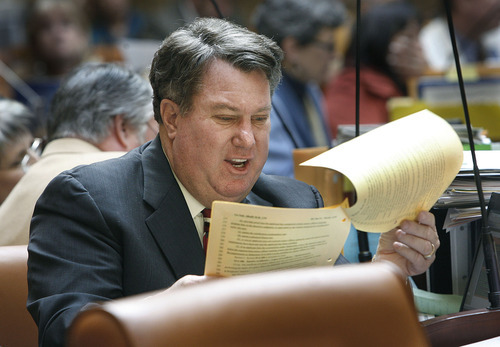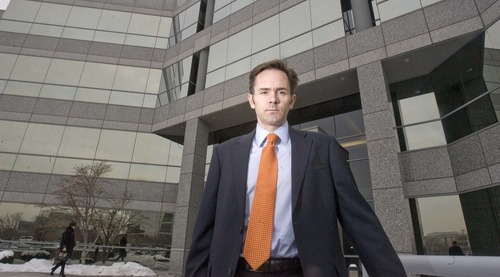This is an archived article that was published on sltrib.com in 2011, and information in the article may be outdated. It is provided only for personal research purposes and may not be reprinted.
The Utah Legislature appears poised to stifle any legislation that might help thousands of Utah homeowners facing foreclosure, punting decisions on those issues back to the courts.
But federal courts in Utah, where most foreclosure lawsuits end up, have been downright cold toward homeowners seeking relief from what they claim are illegal actions on behalf of banks and others.
In case after case, federal judges have sided with banks and foreclosure trustees in lawsuits that raise legal questions about their ability to take property when loans become delinquent.
State courts, according to homeowner attorneys, have been more open to foreclosure lawsuits. Given that, banks and others seeking to foreclose are automatically moving cases filed into federal court. Homeowners have never even be allowed to gather evidence from the foreclosure entities because their cases are quickly dismissed.
Attorney Abraham Bates, whose firms has filed more than 100 lawsuits over foreclosure issues, said U.S. District courts in Utah likely have been hostile toward such suits because unlike state judges, federal jurists come largely from firms that service corporate clients and are not disposed to treat consumer complaints favorably. But he said federal judges also have heavy caseloads and look to get rid of cases quickly.
Foreclosure lawsuits have "created a massive workload for judges," said Bates, and in dismissing them the jurists tend to lump all foreclosure complaints together with earlier ones that he said were "poorly pled."
Now, at least three of cases from Utah have been appealed to the 10th Circuit Court of Appeals in Denver, whose rulings could clarify whether the legal issues are serious and need more judicial consideration. Rulings in favor of the homeowners could throw up roadblocks to the foreclosures in Utah, where 10,000 such processes were pending at the end of 2010, and also could affect property registration records.
—
Utah's premier case • On Thursday, the 10th Circuit has scheduled oral arguments on a case that for a short time halted a significant number of foreclosures in Utah.
St. George resident Peni Cox sued in state court in April 2010 after a foreclosure notice was entered on her home. Her lawsuit alleged the foreclosing entity, ReconTrust Co., was not registered to do business in Utah and was not legally appointed to carry out the foreclosure by another entity that owned Cox's mortgage note.
In May, 5th District Court Judge James L. Shumate of St. George ordered a temporary restraining order on ReconTrust that halted more than 400 foreclosure sales in Utah and affected 900 others that were pending. About three weeks later, after ReconTrust attorneys moved the case to federal court in Salt Lake City, U.S. District Judge Clark Waddoups lifted the stay.
Cox's attorneys have appealed that decision to the 10th Circuit Court of Appeals. Cox's attorney, Craig Smay, said this might be the first oral arguments before the 10th Circuit of a Utah foreclosure case.
"What is being asked basically in Denver is that the Court of Appeals rule that the federal district court here lacked jurisdiction to interfere with the injunction," he said.
The state of Utah has successfully intervened in the case, its brief there is the first legal reaction to the wave of foreclosures. Assistant Attorney General Jerrold Jensen said the ReconTrust, a unit of Bank of America, is not allowed under Utah law to conduct foreclosure sales.
"The brief says Judge Waddoups was dead wrong," said Jensen. "State law should prevail, and Bank of America makes just a ludicrous argument that ought to be rebuffed."
A Bank of America spokeswoman said the company believes the district court ruling was correct and should not be overturned by the Appeals Court.
ReconTrust initiates about 4,000 foreclosures a year in Utah. A ruling by the 10th Circuit favorable to Cox might mean the state court injunction is back in place, Smay said.
—
Taking on MERS • Another case being appealed to the 10th Circuit takes aim at the question of whether an entity created by the Mortgage Bankers Association can legally initiate foreclosure actions in Utah.
Ogden resident Charlene Burnett sued when her home was foreclosed on and sold in 2009. Named were the Mortgage Electronic Registration Systems (MERS) and James Woodall, a South Jordan attorney who was appointed to carry out the foreclosure.
Burnett's attorneys argued that MERS could not legally appoint Woodall under Utah law and that he violated the federal Fair Debt Collection Practices Act.
MERS was created in the mid-1990s by the Mortgage Bankers Association to facilitate the process where mortgage notes were sold and resold until they were bundled together and peddled to a pool of investors. MERS was recorded in county records as the holder of all mortgages owned by its members, and it claimed the authority to foreclose.
Burnett's attorneys argued that because MERS is not the actual mortgage holder — called a beneficiary — it cannot under Utah law initiate foreclosure proceedings.
But Judge Dale Kimball granted a motion to dismiss the case.
"He not only granted the motion and said Woodall was not liable under the Fair Debt Collection Act but, even though there was no motion pending by MERS, he said MERS can be a beneficiary and he dismissed the entire case," said Brian W. Steffensen, a Salt Lake City consumer rights attorney who represents Burnett.
Steffensen is asking that the case be sent back to Utah so he can question MERS officials and agents.
—
Contract language • Bates said federal judges are relying on MERS' and banks' argument that Utahns signed mortgage notes and trust deeds in which they agreed that MERS could foreclose if there were a default.
"If I have a $5,000 car and I offer it to you for $100,000 and you agree to pay for it, we have a binding contract," said Bates. "That may be unfair to you, but you signed that contract and you owe that money. So that's the banks' response to this."
Federal courts are, he said, "predisposed and suspicious anytime homeowners breech a contract on a mortgage."
But MERS and its role were never laid out to homeowners before closings, and the homeowners did not understand what they were agreeing to, Bates argues.
"Is the Mortgage Electronic Registration Systems ever discussed with them?" Bates said. "Absolutely not."
Bates believes he has the ideal case before the 10th Circuit to test the role of MERS in foreclosures.
He represents Richard W. Harris, who took out a loan in 2007 to buy a property in Riverton but was foreclosed on in 2009 when MERS appointed Woodall as trustee to carry out a sale.
Bates sued Woodall and MERS, citing several legal questions but mainly arguing that MERS was not the owner or beneficiary of a mortgage note and therefore could not under Utah law legally begin a foreclosure proceeding. MERS has even admitted in other cases that it does not own mortgage notes and does not receive any payments, criteria necessary to be a beneficiary under Utah law, he said.
Yet, in the notice of default in the Harris case, MERS claims that it is a beneficiary.
"This is the smoking gun," Bates said.
MERS' database lists Bank of America as the trustee for the investors who own the Harris mortgage note, Bates said.
U.S. District Judge Tena Campbell disagreed, dismissing the case in ruling that MERS is the beneficiary and able to foreclose.
Bates said as part of the appeal he will ask the Utah Supreme Court to determine whether MERS can legally act as the note owner.
A favorable 10th Circuit ruling in the case will "put up a wall" to foreclosures in Utah, he said.
—
MERS backs down • MERS has blinked on some legal issues. It recently said it is revising its rules so its members — banks and other entities — cannot use its name to foreclose.
"Our members must not foreclose with Mortgage Electronic Registration Systems Inc. as the mortgagee of record," Dan McLaughlin, executive vice president of MERS, said in an e-mail.
If MERS is listed with county recorders as the beneficiary, MERS members must amend the record to reflect whomever holds the mortgages note, he said.
Chris Peterson, a University of Utah law professor and expert in foreclosure issues, said the announcement shows an intention "to declare defeat on one of the key issues of their business model. Part of the strategy all along was to do all of the foreclosure in the name of MERS."
Legislative foreclosure bills
SB261 • Sponsored by Sen. Curt Bramble, would modify laws by creating penalties for wrongful foreclosures and require notification to a homeowner that a pending foreclosure will continue despite loan modification-talks. Being held without a vote on Senate calendar.
HB326 • Sponsored by Rep. LaVar Christensen, would establish a procedure in which a loan servicer and borrower in foreclosure could try to negotiate a loan modification. Was voted down in committee.
HB457 • Sponsored by Rep. Susan Duckworth, would require transactions involving a financial interest in a property be recorded with counties and that contact information be included. Stalled in House Rules Committee.
HB378 • Sponsored by Rep. Curt Webb, would revise statues related to appointments and duties of trustees who are legal holders of property titles subject to provisions of a mortgage note. Stalled in House Rules Committee.







